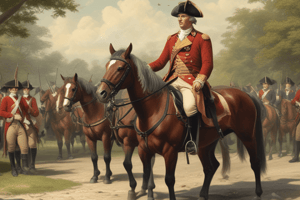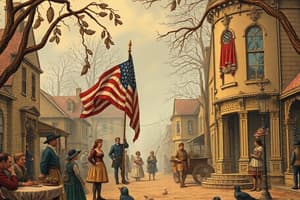Podcast
Questions and Answers
What was a significant consequence for the British following the French and Indian War?
What was a significant consequence for the British following the French and Indian War?
The Proclamation of 1763 had which of the following effects?
The Proclamation of 1763 had which of the following effects?
What was the primary purpose of the Sugar Act of 1764?
What was the primary purpose of the Sugar Act of 1764?
What was the main grievance expressed by colonists with the phrase 'No taxation without representation!'?
What was the main grievance expressed by colonists with the phrase 'No taxation without representation!'?
Signup and view all the answers
Which act was specifically a response to the Boston Tea Party?
Which act was specifically a response to the Boston Tea Party?
Signup and view all the answers
What was a primary purpose of the Writs of Assistance?
What was a primary purpose of the Writs of Assistance?
Signup and view all the answers
What did the Tea Act aim to accomplish for British merchants?
What did the Tea Act aim to accomplish for British merchants?
Signup and view all the answers
What would a loyalist likely argue regarding the British government?
What would a loyalist likely argue regarding the British government?
Signup and view all the answers
Study Notes
French and Indian War Concerns
- British major concern: relationship with Natives and France
- British incurred debt from war
- British inability to trade with foreign nations
Taxation Without Representation
- Meaning: Colonists should not be taxed without having representation in government.
Acts and Events
- French and Indian War: Conflict between Britain and France; ended in the Treaty of Paris (1763)
- Proclamation of 1763: Declared land west of the Appalachian Mountains as Native American territory
- Sugar Act (1764): Tax on imported foreign sugar
- Stamp Act (1765): Tax on printed materials
- Writs of Assistance: Allowed British officials to search colonial homes and businesses without specific reason
- Townshend Acts: Taxes on glass, lead, paint, and tea
- Tea Act: Reduced tax on British tea to make it more affordable and gain better sales in America
- Boston Tea Party: Colonists dressed as Native Americans and dumped British tea into Boston Harbor in protest.
- Intolerable Acts: Punitive laws passed by the British Parliament in response to the Boston Tea Party.
Patriot, Loyalist, and Neutralist Perspectives
- Patriot: Supported revolution and independence from Great Britain.
- Loyalist: Supported British rule and connection to the crown.
- Neutralist: Took no side and prioritized personal gain.
Studying That Suits You
Use AI to generate personalized quizzes and flashcards to suit your learning preferences.
Related Documents
Description
Explore the major events and legislative acts that led to colonial discontent and the American Revolution. This quiz covers key topics such as the French and Indian War, taxation without representation, and significant Acts like the Stamp Act and the Tea Act. Test your knowledge on how these factors shaped the relationship between the American colonies and Britain.




